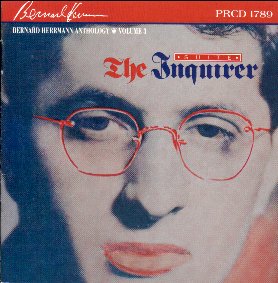Music Webmaster Len Mullenger |
||
Music Webmaster Len Mullenger |
||
 |
FILM MUSIC RECORDINGS REVIEWS |
 |
October 1998
| Discs on these pages are offered for sale. There is also a page of search engines from a selection of on-line retailers here. Please support this web-site |
Bernard HERRMANN
The Inquirer (Film music compilation)
 Various orchestras and artists Various orchestras and artists  PREAMBLE PRCD 1789 [78:45]
PREAMBLE PRCD 1789 [78:45] |
|
|
Crotchet (UK) |
Music from: Citizen Kane; The Magnificent Ambersons; The Day the Earth Stood Still; The Kentuckian; Williamsburg; Night Digger; Battle of Neretva; Sisters

At 78 minutes duration, this CD, with its remarkable content, is marvellous
value. I will not remark on the excerpts from Citizen Kane and The
Magnificent Ambersons for these will be covered in a separate review
on this site next month of the the ATM CD from which they come - Bernard
Herrmann "Orson Welles at the Movies: Citizen Kane; The Magnificent Ambersons"
; save to say that the Citizen Kane excerpts comprise: "The Inquirer"
(the music associated with Kane's newspaper), the "Breakfast Montage" and
"Salambo's Aria"; and The Magnificent Amberson's cues are: the two
nocturnes and Theme and Variations (based on a Waldteufel waltz).
From The Day the Earth Stood Still there are two short cues associated with the alien's (Michael Rennie) tour of Washington with the boy he befriends: "Lincoln Memorial" and "Arlington Cemetery".Herrmann creates a hymn-like meditation using trumpet and quasi-church harmonium. It's rather as if Herrmann was writing nostalgically of a scene that once existed; appropriately in the sense that the alien has the power to quickly put the US Capital in the past tense.
The 1955 film The Kentuckian (which starred Burt Lancaster) was one of only two westerns that Herrmann scored (the other was Garden of Evil). Herrmann eschews the traditional western score in favour of music that weaves patterns around traditional reels and hoedowns (the story is set in the early America of 1820 so the Englishness of the music is not inappropriate - in fact Herrmann based his score on some of the music he had created for his radio score for "A Shropshire Lad." It is one of Herrmann's most genial and optimistic scores although there are fierce enough thunder clouds about when the villain appears (Walter Matthau in his debut role).
Williamsburg: The Story of a Patriot was music for the film presentation at the Visitors' Center at Colonial Williamsburg in Virginia. It is stately music written in the eighteenth century tradition.
Night Digger (known as The Road Builder in the UK) was a 1971 British thriller about a middle aged spinster (Patricia Neal) who falls in love with a young handyman (Nicholas Clay) only to discover he is a psychopath. Herrmann revisits Psycho country for this film with shrill string and harp glissandi and slashing octave leaps in dissonant chordal patterns. Herrmann also employs a harmonica (which is associated with the killer) that intrudes uncomfortably and unsettlingly above the string orchestra playing in conventional mode; and the warmer tones of a viola d'amore are used to evoke the poignancy of the doomed love.
Sisters is another excursion into the macabre. The 1972 Brian de Palma shocker starred Margot Kidder (such a nice girl as Christopher Reeve's Superman's original Lois Lane) as a schizophrenic killer whose sexual encounters bring out her dead sister's homicidal tendencies. In this short cue, "Cake Death" a suitor has brought her a birthday cake. What she does with the cake knife is rather messy! The music is dominated by pointillistic colourings as though to illustrate the flickering candles on the birthday cake and/or the disorientated state of the killer's mind. Remote key celeste and horn chords reinforce this impression while snarling horn and creepy bassoon figures suggest murder.
The Battle of Nerevta (1971) was a World War II film about the Tito-led Yugoslavian partisans' struggles against Hitler's war machine. Quoting one writer it uses - "instrumentation...larger than in any other Herrmann score...it rarely flags in the sheer energy of its percussion-laden militaristic drive." A brutal, hard metallic score but with warm compassionate undertones.
The performances by top British and Australian orchestras are all very fine and the sound is very good too.
Ian Lace
Return to October Film Music Reviews